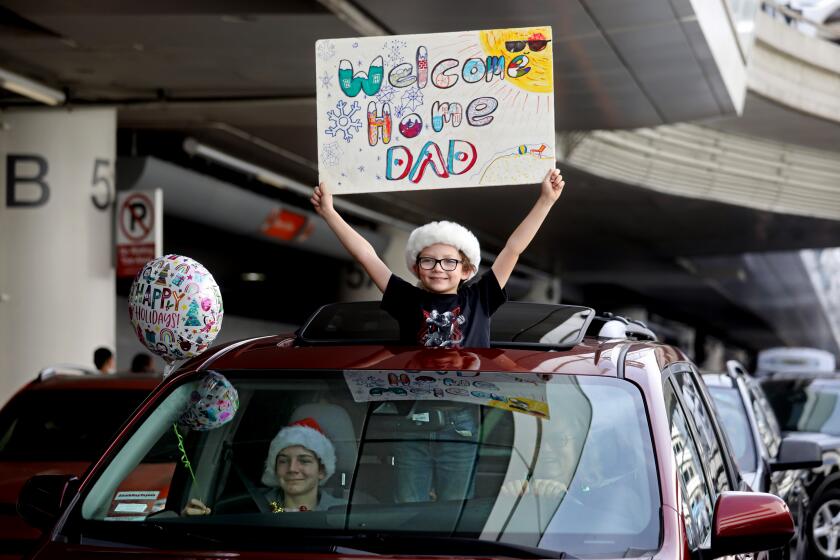UCLA, six other UC campuses to start new term online, and COVID boosters will be required

COVID booster shots will be required for UC students and staff, and chancellors are preparing for a possible return to remote-only classes after break.
- Share via
UCLA and six other University of California undergraduate campuses announced Tuesday that classes will begin remotely at the start of the new term, as colleges throughout the nation wrestle with plans for a safe return after winter break amid an increasingly serious surge of the Omicron coronavirus variant.
Additionally, all eligible students and staff in the 10-campus UC system will be required to provide proof that they have received a COVID-19 booster shot, officials announced.
“The emergence of this new and fast-moving variant, coupled with student travel to and from campus and the prevalence of gatherings over the holidays, will present our campuses with a unique set of public health challenges as we begin the New Year,” UC President Michael V. Drake said in a letter to the chancellors, adding that the plan “may require campuses to begin the term using remote instruction in order to allow students to complete an appropriate testing protocol as they return to campus.”
The letter to chancellors comes as a growing number of universities and colleges push back in-person instruction after the winter break, when students are due to return to campuses from all over the state, country and world. Some universities on the East Coast have opted to finish exams remotely; others have implemented COVID-19 booster mandates for students and staff.
In addition to UCLA, the UC campuses that have announced a two-week delay are Irvine, Riverside, Santa Barbara, Santa Cruz and San Diego; Davis announced a one-week delay. Many universities that are delaying in-person instruction have said campuses and on-campus housing will remain open.
Up to 3.5 million people are expected to travel through LAX from Dec. 16-Jan. 3, airport officials said, making it the busiest travel period this year.
UC Berkeley, which is on a semester schedule, starts later than most campuses and is monitoring the situation, as is UC Merced.
During UCLA’s delay, students and staff must participate in a robust coronavirus testing regimen and show proof of booster shots. All faculty and staff will be required to test once a week throughout the winter quarter, regardless of vaccination status, Administrative Vice Chancellor Michael J. Beck and Professor Megan McEvoy said in a statement to the UCLA community.
“This new safety protocol will help us to quickly identify the presence of COVID-19 in our community while limiting major disruption of campus activities and reducing the risk of serious complications from COVID-19, “ the statement said.
UC Irvine said its delay allows time for “extensive testing, retesting and sequestration following the winter recess,” spokesperson Sheri Ledbetter said.
In addition to online classes for the first two weeks of the term, UC Santa Cruz is recommending that faculty and staff hold meetings and events remotely.
UC San Diego Chancellor Pradeep K. Khosla said in a statement that the school’s temporary move online anticipates “a surge that may coincide with the planned start of our in-person, residential Winter Quarter.” Campus residents can return but are being asked to stagger their arrival.
Large, indoor events at UC Riverside will be barred during the first two weeks of the new term as classes go remote until Jan. 17, said Chancellor Kim A. Wilcox. And UC Davis will begin remotely for at least a week to give campus community members time to secure a negative COVID-19 test before returning to in-person classes Jan. 10.
USC, meanwhile, announced Friday that it is considering a remote start and would likely require booster shots for students. The university said it was monitoring the rise of coronavirus cases on campus, in the community and at other higher-education institutions.
The California State University system said Tuesday that it is not planning to go remote.
“We continue to monitor the situation, and should a pivot become necessary, campuses will make sure to communicate with their respective campus communities as soon as possible,” spokesperson Toni Moelle said.
Drake’s letter said booster shots are essential at UC campuses.
“I am also asking each of you to communicate the critical importance of boosters to your campus community, especially at this stage of the pandemic,” he wrote. “Under existing UC policy, students, faculty and staff are required to keep their vaccination status up to date. The policy mandates COVID-19 boosters for those who are eligible.”
Although the booster mandate applies systemwide, it is up to campuses to implement it based on local conditions. Some seemed unclear about the mandate; UC campuses at San Diego and Merced said they are recommending but not requiring a booster shot. UC San Francisco, a graduate level and professional education campus dedicated to health sciences, said it has launched a campaign to encourage eligible students and employees to get booster shots by Jan. 15.
The Food and Drug Administration last month authorized Moderna and Pfizer-BioNTech booster shots for those age 18 and older and on Dec. 9 expanded the directive to include 16- and 17-year-olds.
UC student leaders have supported the idea of a move to online classes at the start of the winter semester in light of the spread of the Omicron variant.
“I’m happy to see UC go online — at least temporarily,” said UC Student Assn. leader Esmeralda Quintero-Cubillan, 23, a senior at the Santa Barbara campus. “I say this remorsefully, as someone that thought my senior year would be in-person, but for the risk of public health and the health and well-being of our community, I think it makes sense to move online.”
But Quintero-Cubillan, a resident assistant, remains concerned about what the delay could mean for student housing and food security.
“I’m a student that has contended with food insecurity my entire time at UC; I’ve faced homelessness,” Quintero-Cubillan said. “I have a lot of fear.”
Manu Agni, president of the Associated Students of UC San Diego, was supportive of the move to online instruction yet frustrated with the situation.
“We feel like we’ve done a great job at keeping our community safe. But now rising cases of Omicron and Delta in San Diego County and California [are] causing this change, so we feel like we’re facing the consequences of someone else’s actions,” Agni, 21, said. “We understand it’s science-based, but it is still sad and disappointing.”
The first semester back on campus after a months-long hiatus was celebratory, Agni said. The senior, who is studying urban planning, hopes the possible two-week shift to online instruction doesn’t extend longer but understands the importance of following the science.
“The right choice isn’t always the most exciting one,” Agni said.
Naomi Waters, a UC Riverside senior, said she was relieved about the temporary switch to online instruction. She had been nervously watching reports of the spread of the Omicron variant and thought gathering students again after the holidays would be risky.
“I was quite scared, honestly, at the prospect of folks going back to in-person classes,” she said. “I’m definitely relieved that they’re taking campus safety to heart.”
Waters, who is majoring in public policy and African American studies, said she supports requiring booster shots for campus members. As a senior, she said, she no longer takes large lecture classes and felt safe in the one in-person class she had this quarter, which had about 10 students who wore masks and were able to distance themselves in a large room with open doors. But a booster would help ensure greater safety for all students, she added.
More to Read
Sign up for Essential California
The most important California stories and recommendations in your inbox every morning.
You may occasionally receive promotional content from the Los Angeles Times.














